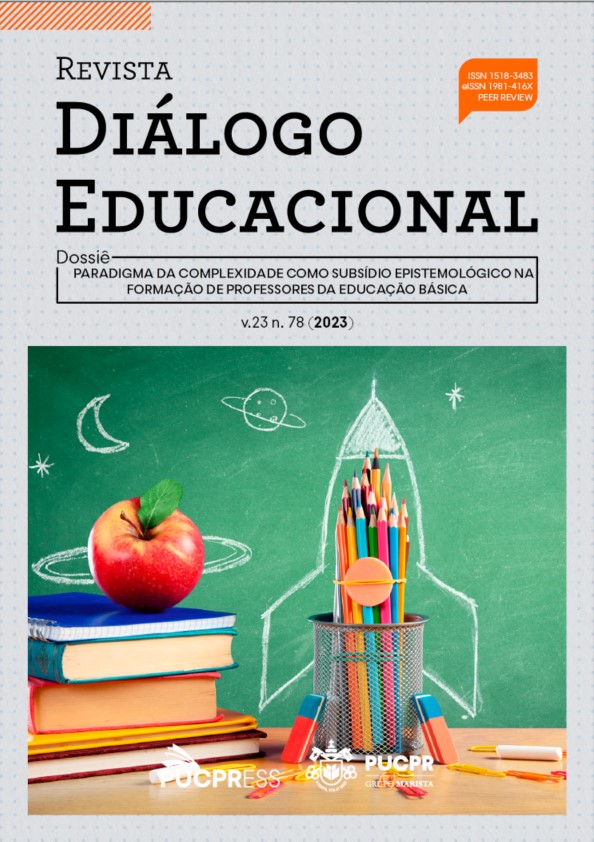Navigating is imprecise
incorporating the complexity paradigm in teacher training
DOI:
https://doi.org/10.7213/1981-416X.23.078.DS05Abstract
We aim to explore in this article the main implications of the complexity paradigm in teacher education. The article is divided into five parts. In the first, we provide a general introduction to the complexity paradigm with classic references on the subject such as Fritjof Capra and Ludwig von Bertalanffy. Then, we begin to extract some of its main consequences. In the second section, we seek to demonstrate that according to the complexity paradigm, there is no possibility of continuing to work with the modern conception of the "subject" as an essentially rational, conscious and free substance. Without the figure of the subject, it becomes necessary to rethink the very meaning of "knowledge," which we propose in section three with the help of biologists Maturana and Varela. Next, we indicate that the complexity paradigm destroys the boundary between nature and artifice and explore the possibilities of this indistinction with Donna Haraway's Cyborg Manifesto and MD Magno's Psychoanalysis - a thinker who incorporates the complexity paradigm in psychoanalysis. We conclude our investigations with the proposal of an ethics of regency beyond repression and freedom. In our final considerations, we discuss the theory of Chaos, whose mathematics have become fundamental for describing complex systems, and we try to indicate what, in our view, would be the main contribution of the complexity paradigm in teacher education.
Downloads
References
AMARAL, L.; OTTINO, J. Complex Networks: augmenting the framework for the study of complex systems. European Physical Journal B. 38, 147–162 (2004), pp. 147-162
ARAUJO, R. A cidade sou eu. Tese de Doutorado apresentada ao Programa de Pós-Graduação em Urbanismo – PROURB – da Faculdade de Arquitetura e Urbanismo da Universidade Federal do Rio de Janeiro / UFRJ. Orientadora: Profa. Dra. Denise B. Pinheiro Machado. Rio de Janeiro, 2007
BERTALANFFY, L. Teoria Geral dos Sistemas. Petrópolis: Vozes, 2009
CAPRA, F. A Teia da Vida. São Paulo: Cultrix, 2006
CARVALHO, H. Ciborgues e monstros em não-lugares. Revista Educação: teoria e prática, Rio Claro, SP, Brasil, 2013
FOUCAULT, M. Vigiar e Punir. Petrópolis: Vozes, 2013
GLEICK, J. Caos: a criação de uma nova ciência. Rio de Janeiro: Campus, 1990
HARAWAY, D. Manifiesto Cyorg. (Trad. Manuel Talens) Valencia: Tritivillus, 2019
LATOUR, Bruno. Investigación sobre los modos de existencia. Buenos Aires: Paidós, 2013
LAW, J. Notas sobre a teoria do ator-rede: ordenamento, estratégia e heterogeneidade. In: NECSO-UFRJ, Traduções de Textos Selecionados sobre CeT. Tradução de Fernando Manso. Disponível online em: http://www.necso.ufrj.br/Trads/Notas%20sobre%20a%20teoria%20Ator-Rede.htm (último acesso em 30/04/2023).
MAGNO, MD. Arte e Fato. Rio de Janeiro: NovaMente, 2001
MAGNO, MD. Est’Ética da Psicanálise. Rio de Janeiro: Imago, 1992
MATURANA, H; VARELA, F. A árvore do conhecimento: as bases biológicas da compreensão humana. São Paulo: Palas Athena, 2001
MILL, J.S. A System of Logic. Ratiocinative and Inductive. London: Longmans, Green, and Co., 1906
O’CONNOR, T. Emergent Properties. In: Stanford Encyclopedia of Philosophy. Winter 2021 Edition, Edward N. Zalta (ed.), Disponível online em: <https://plato.stanford.edu/archives/win2021/entries/properties-emergent/> (último acesso em 30/04/2023 às 09:25)
ROVELLI, C. A realidade não é o que parece. Rio de Janeiro: Objetiva, 2014
SPINOZA, B. Ética. Belo Horizonte: Autêntica, 2016
Downloads
Published
How to Cite
Issue
Section
License
Copyright (c) 2023 Editora Universitária Champagnat

This work is licensed under a Creative Commons Attribution 4.0 International License.
O(s) autor(es) transfere(m), por meio de cessão, à EDITORA UNIVERSITÁRIA CHAMPAGNAT, pessoa jurídica de direito privado, inscrita no CNPJ/MF sob o n.º 76.659.820/0009-09, estabelecida na Rua Imaculada Conceição, n.º 1155, Prado Velho, CEP 80.215-901, na cidade de Curitiba/PR, os direitos abaixo especificados e se compromete a cumprir o que segue:
- Os autores afirmam que a obra/material é de sua autoria e assumem integral responsabilidade diante de terceiros, quer de natureza moral ou patrimonial, em razão de seu conteúdo, declarando, desde já, que a obra/material a ser entregue é original e não infringe quaisquer direitos de propriedade intelectual de terceiros.
- Os autores concordam em ceder de forma plena, total e definitiva os direitos patrimoniais da obra/material à EDITORA UNIVERSITÁRIA CHAMPAGNAT, a título gratuito e em caráter de exclusividade.
- A CESSIONÁRIA empregará a obra/material da forma como melhor lhe convier, de forma impressa e/ou on line, inclusive no site do periódico da EDITORA UNIVERSITÁRIA CHAMPAGNAT, podendo utilizar, fruir e dispor do mesmo, no todo ou em parte, para:
- Autorizar sua utilização por terceiros, como parte integrante de outras obras.
- Editar, gravar e imprimir, quantas vezes forem necessárias.
- Reproduzir em quantidades que julgar necessária, de forma tangível e intangível.
- Adaptar, modificar, condensar, resumir, reduzir, compilar, ampliar, alterar, mixar com outros conteúdos, incluir imagens, gráficos, objetos digitais, infográficos e hyperlinks, ilustrar, diagramar, fracionar, atualizar e realizar quaisquer outras transformações, sendo necessária a participação ou autorização expressa dos autores.
- Traduzir para qualquer idioma.
- Incluir em fonograma ou produção audiovisual.
- Distribuir.
- Distribuir mediante cabo, fibra ótica, satélite, ondas ou qualquer outro sistema que permite ao usuário realizar a seleção da obra ou produção para recebê-la em tempo e lugar previamente determinados por quem formula a demanda e nos casos em que o acesso às obras ou produções se faça por qualquer sistema que importe em pagamento pelo usuário.
- Incluir e armazenar em banco de dados, físico, digital ou virtual, inclusive nuvem.
- Comunicar direta e/ou indiretamente ao público.
- Incluir em base de dados, arquivar em formato impresso, armazenar em computador, inclusive em sistema de nuvem, microfilmar e as demais formas de arquivamento do gênero;
- Comercializar, divulgar, veicular, publicar etc.
- Quaisquer outras modalidades de utilização existentes ou que venham a ser inventadas.
- Os autores concordam em conceder a cessão dos direitos da primeira publicação (ineditismo) à revista, licenciada sob a CREATIVE COMMONS ATTRIBUTION LICENSE, que permite o compartilhamento do trabalho com reconhecimento da autoria.
- Os autores autorizam a reprodução e a citação de seu trabalho em repositórios institucionais, página pessoal, trabalhos científicos, dentre outros, desde que a fonte seja citada.
- A presente cessão é válida para todo o território nacional e para o exterior.
- Este termo entra em vigor na data de sua assinatura e é firmado pelas partes em caráter irrevogável e irretratável, obrigando definitivamente as partes e seus sucessores a qualquer título.
- O não aceite do artigo, pela EDITORA UNIVERSITÁRIA CHAMPAGNAT, tornará automaticamente sem efeito a presente declaração.













